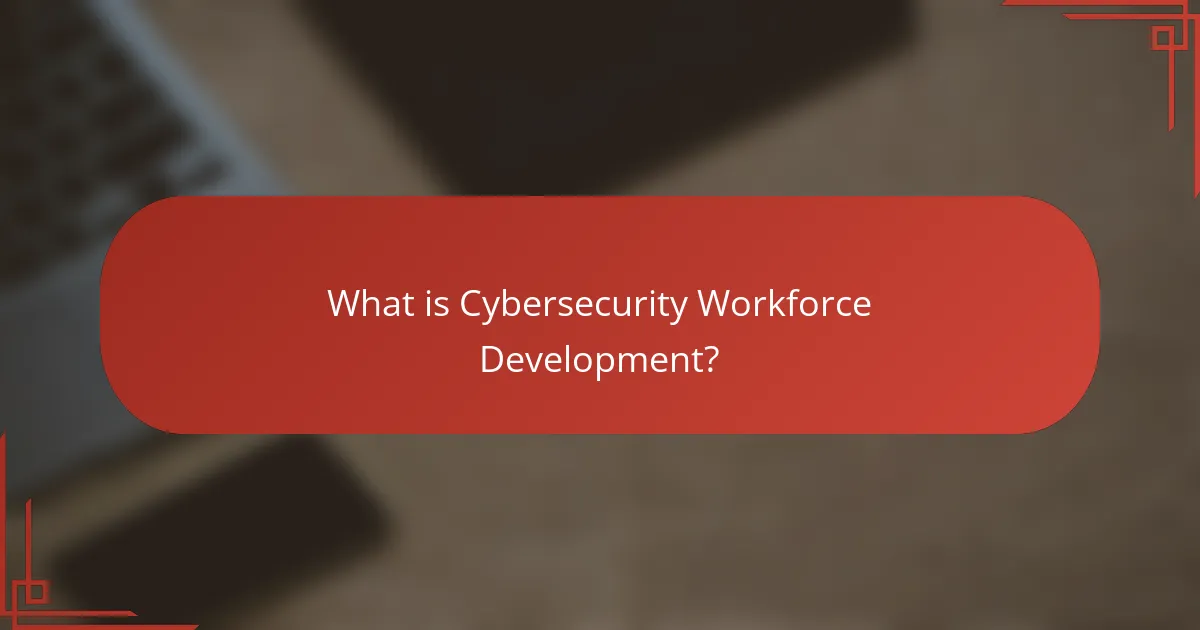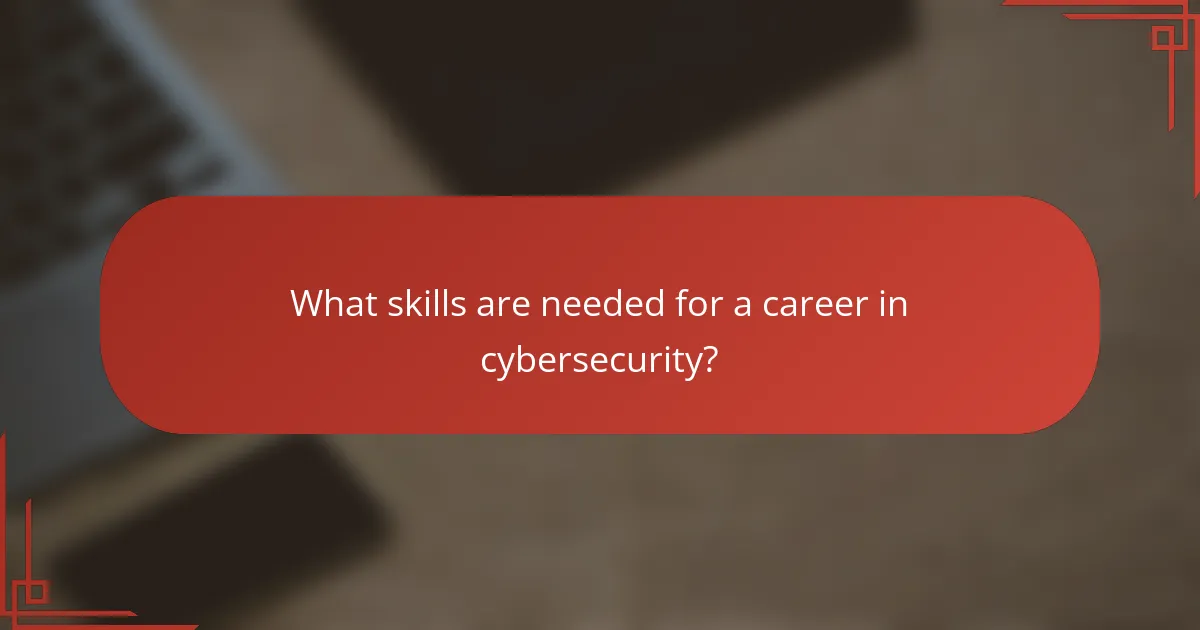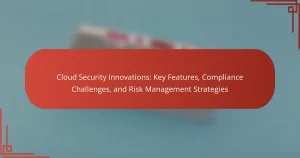Cybersecurity Workforce Development focuses on equipping individuals with the necessary skills, knowledge, and competencies to pursue careers in cybersecurity. This process involves various training programs, certifications, and hands-on experiences to help address the global shortage of 3.4 million cybersecurity professionals. Key technical skills required include networking, operating systems, programming languages, and risk management, complemented by essential soft skills like problem-solving and communication. The article highlights various training options, including popular certifications and degree programs, as well as the diverse career opportunities available within the cybersecurity field, reflecting a projected 31% growth in employment from 2019 to 2029.

What is Cybersecurity Workforce Development?
Cybersecurity Workforce Development is the process of preparing individuals for careers in cybersecurity. It focuses on building skills, knowledge, and competencies needed to protect information systems. This development includes training programs, certifications, and hands-on experience. Organizations invest in workforce development to address the growing skills gap in the cybersecurity field. According to (ISC)², there is a global shortage of 3.4 million cybersecurity professionals. Effective workforce development can help bridge this gap and enhance overall security.
Why is Cybersecurity Workforce Development important?
Cybersecurity workforce development is important because it addresses the growing skills gap in the industry. The demand for cybersecurity professionals is increasing rapidly due to rising cyber threats. According to the Cybersecurity Workforce Study, there will be 3.5 million unfilled cybersecurity jobs by 2025. This highlights the urgent need for trained professionals in the field. Workforce development initiatives help create a skilled pipeline of talent. They provide necessary training and education to equip individuals with relevant skills. Furthermore, a well-trained workforce enhances organizational security posture. This ultimately leads to better protection against cyber attacks and data breaches.
What are the current challenges in the cybersecurity workforce?
The current challenges in the cybersecurity workforce include a significant skills gap and high turnover rates. The skills gap indicates that there are not enough qualified professionals to meet demand. According to (ISC)², there is a shortage of 3.4 million cybersecurity professionals globally. High turnover rates further exacerbate this issue, with many professionals leaving for better opportunities. Additionally, the rapid evolution of cyber threats requires continuous learning and adaptation. Many existing training programs do not keep pace with emerging technologies. This disconnect leads to a workforce that is often unprepared for current challenges. Furthermore, diversity in the cybersecurity field remains low, limiting perspectives and innovation. These challenges collectively hinder the effectiveness of cybersecurity efforts across industries.
How does workforce development address these challenges?
Workforce development addresses challenges in cybersecurity by enhancing skill sets and improving training programs. It focuses on bridging the skills gap in the industry. Targeted training equips individuals with essential cybersecurity knowledge. Programs often include hands-on experience and certifications. This practical approach increases employability in a high-demand field. Collaborations between educational institutions and employers ensure curriculum relevance. Data from the Cybersecurity Workforce Study indicates a significant shortage of skilled professionals. By aligning training with industry needs, workforce development effectively prepares candidates for current challenges.
What are the key components of Cybersecurity Workforce Development?
Key components of Cybersecurity Workforce Development include skills training, certification programs, and mentorship opportunities. Skills training covers technical and soft skills essential for cybersecurity roles. Certification programs, such as CompTIA Security+ and CISSP, validate knowledge and enhance credibility. Mentorship opportunities connect experienced professionals with newcomers, facilitating knowledge transfer. Collaboration with educational institutions ensures relevant curriculum development. Industry partnerships provide real-world experience through internships and job placements. Continuous learning is vital due to the evolving nature of cyber threats. These components collectively build a competent cybersecurity workforce.
What skills are essential for cybersecurity professionals?
Essential skills for cybersecurity professionals include technical proficiency, analytical skills, and problem-solving abilities. Technical proficiency involves knowledge of networks, systems, and security protocols. Familiarity with programming languages like Python or Java is crucial. Analytical skills help in assessing threats and vulnerabilities. Cybersecurity professionals must evaluate data to identify potential security breaches. Problem-solving abilities are necessary for addressing security incidents effectively. Communication skills are also important for explaining complex issues to non-technical stakeholders. A 2021 report by CyberSeek highlights that demand for cybersecurity skills has increased by 50% over the past five years.
How do these skills evolve with technological advancements?
Cybersecurity skills evolve through continuous adaptation to new technologies and threats. As technology advances, new vulnerabilities emerge, requiring updated skill sets. Professionals must learn about artificial intelligence, machine learning, and cloud security. These areas are increasingly relevant in the cybersecurity landscape. Training programs are adapting to include these emerging technologies. Certifications are also evolving to reflect current industry standards. For instance, the CompTIA Security+ certification has incorporated cloud security topics. Additionally, hands-on experience with new tools is essential for skill development. Continuous learning is vital in keeping pace with technological advancements.

What skills are needed for a career in cybersecurity?
A career in cybersecurity requires a variety of technical and soft skills. Technical skills include knowledge of networking, operating systems, and security protocols. Proficiency in programming languages like Python or Java is essential. Familiarity with cybersecurity tools and software is also important. Additionally, understanding risk assessment and management is crucial for identifying vulnerabilities. Soft skills such as problem-solving and analytical thinking enhance a cybersecurity professional’s effectiveness. Strong communication skills are necessary for conveying technical information to non-technical stakeholders. Continuous learning and adaptability are vital due to the evolving nature of cyber threats. According to the Cybersecurity Workforce Study by (ISC)², there is a significant demand for skilled professionals in this field, underscoring the importance of these skills.
What technical skills are critical for cybersecurity roles?
Critical technical skills for cybersecurity roles include network security, risk assessment, and incident response. Network security involves protecting data and systems from unauthorized access. Proficiency in firewalls, VPNs, and intrusion detection systems is essential. Risk assessment requires the ability to identify vulnerabilities and evaluate potential threats. Professionals must conduct audits and implement security measures based on findings. Incident response skills are necessary for effectively managing and mitigating security breaches. This includes developing and executing response plans. Knowledge of programming languages like Python and JavaScript is also beneficial. These skills enable automation of security tasks and analysis of malware. Familiarity with security frameworks, such as NIST and ISO, is important for compliance and best practices.
How do programming languages contribute to cybersecurity?
Programming languages contribute to cybersecurity by enabling the development of secure software and systems. They provide the tools necessary for creating applications that can resist attacks and vulnerabilities. For instance, languages like Python and Java are widely used for building security tools and scripts. These languages allow developers to implement encryption, authentication, and access control measures effectively.
Moreover, understanding programming languages helps cybersecurity professionals analyze and reverse-engineer malicious code. Proficiency in languages such as C and C++ is crucial for identifying vulnerabilities in software and systems. According to the 2022 Cybersecurity Workforce Study by (ISC)², 70% of cybersecurity professionals reported that coding skills are essential for their roles. This highlights the importance of programming languages in enhancing cybersecurity measures and practices.
What role do networking skills play in cybersecurity?
Networking skills are essential in cybersecurity as they enable professionals to understand and manage network architectures effectively. These skills help in identifying vulnerabilities within a network. They also facilitate the implementation of security measures to protect data integrity and confidentiality. Proficiency in networking allows for effective monitoring of network traffic for suspicious activities. Furthermore, networking knowledge aids in troubleshooting security incidents and breaches. According to the Cybersecurity Workforce Study by (ISC)², 70% of cybersecurity professionals emphasize the importance of networking skills in their roles. This underscores the critical nature of networking abilities in developing robust cybersecurity strategies.
What soft skills are important in the cybersecurity field?
Critical thinking is an important soft skill in the cybersecurity field. It enables professionals to analyze complex problems and identify effective solutions. Communication skills are also essential. They allow cybersecurity experts to convey technical information clearly to non-technical stakeholders. Teamwork is another vital soft skill. Cybersecurity often requires collaboration across various departments and teams. Adaptability is crucial as well. The cybersecurity landscape frequently changes, requiring professionals to adjust strategies and approaches. Lastly, attention to detail is necessary. Small oversights can lead to significant security vulnerabilities. These soft skills collectively enhance the effectiveness of cybersecurity professionals in their roles.
How does communication enhance cybersecurity effectiveness?
Effective communication enhances cybersecurity by facilitating information sharing and collaboration among team members. Clear communication ensures that all personnel are aware of potential threats and vulnerabilities. It allows for timely reporting of incidents, which is crucial for rapid response. Regular training and updates foster a culture of security awareness. According to a 2020 study by the Ponemon Institute, organizations with strong communication practices experience 30% fewer security breaches. This demonstrates that effective communication directly contributes to improved cybersecurity outcomes.
Why is problem-solving vital in cybersecurity roles?
Problem-solving is vital in cybersecurity roles because it enables professionals to identify and mitigate threats effectively. Cybersecurity experts face complex and evolving challenges daily. They must analyze security incidents and determine the root cause of vulnerabilities. This requires critical thinking and the ability to devise innovative solutions. According to a study by the International Journal of Information Security, 70% of cybersecurity incidents involve human error. Therefore, problem-solving skills can significantly reduce risks. Additionally, effective problem-solving enhances incident response times, allowing organizations to minimize potential damage. Cybersecurity professionals must also adapt to new technologies and threats, making problem-solving a continuous necessity.

What training programs are available for cybersecurity professionals?
Training programs available for cybersecurity professionals include various certifications and degree programs. Popular certifications are CompTIA Security+, Certified Information Systems Security Professional (CISSP), and Certified Ethical Hacker (CEH). Degree programs include Bachelor’s and Master’s degrees in Cybersecurity or Information Security. Online platforms like Coursera and Udemy offer specialized courses. Additionally, many universities provide boot camps focused on practical skills. These programs equip professionals with essential knowledge and skills for the cybersecurity field.
What types of training programs exist for cybersecurity skills?
There are several types of training programs for cybersecurity skills. These include degree programs, boot camps, online courses, and certification programs. Degree programs typically offer comprehensive education in computer science or information technology. Boot camps provide intensive, short-term training focused on practical skills. Online courses allow for flexible learning at one’s own pace. Certification programs, such as CompTIA Security+ or Certified Information Systems Security Professional (CISSP), validate expertise in specific areas of cybersecurity. Each program type caters to different learning preferences and career goals.
How do formal education programs compare to online courses?
Formal education programs typically offer structured learning environments with accredited curricula. They often provide face-to-face interactions with instructors and peers. This can enhance networking opportunities and collaborative learning. In contrast, online courses offer flexibility in scheduling and location. They allow learners to progress at their own pace, which can be beneficial for those balancing work and study.
According to a report by the U.S. Bureau of Labor Statistics, formal education is often preferred for certain cybersecurity roles, as it may lead to higher starting salaries. However, online courses can be more accessible and cost-effective. A study published in the Journal of Cybersecurity Education found that online learners can achieve comparable knowledge levels to their formally educated counterparts.
Both formats have their advantages and limitations. The choice between them depends on individual learning preferences and career goals.
What certifications are recognized in the cybersecurity industry?
The recognized certifications in the cybersecurity industry include Certified Information Systems Security Professional (CISSP), Certified Ethical Hacker (CEH), and CompTIA Security+. These certifications validate skills and knowledge in various cybersecurity domains. The CISSP is globally recognized and focuses on information security management. The CEH certification emphasizes ethical hacking techniques and methodologies. CompTIA Security+ covers foundational security skills and is often considered an entry-level certification. These certifications are endorsed by industry leaders and are vital for career advancement in cybersecurity.
How can individuals choose the right training program?
Individuals can choose the right training program by assessing their current skills and career goals. They should identify specific areas of cybersecurity they want to focus on, such as network security or ethical hacking. Researching various training programs is essential to understand their content and delivery methods. Reviews and testimonials from previous participants can provide valuable insights into the program’s effectiveness. Additionally, checking the program’s accreditation and alignment with industry standards is crucial. Programs that offer hands-on experience and real-world scenarios are often more beneficial. Finally, considering the program’s duration and flexibility can help individuals fit training into their schedules.
What factors should be considered when selecting a cybersecurity course?
When selecting a cybersecurity course, consider the course content and curriculum. Ensure it covers essential topics like network security, cryptography, and risk management. Look for courses that offer hands-on experience through labs or simulations. Accreditation is important; choose programs from recognized institutions. Evaluate the qualifications and experience of instructors. Research the course delivery format, whether online or in-person, to match your learning style. Check for industry partnerships that may provide networking opportunities. Finally, review student feedback and outcomes to gauge the course’s effectiveness.
How do learning styles influence program choice?
Learning styles significantly influence program choice by determining how individuals prefer to absorb information. Visual learners may opt for programs with strong graphical content and visual aids. Auditory learners might favor lectures, discussions, and podcasts as their primary resources. Kinesthetic learners often choose hands-on training and interactive simulations that allow them to practice skills actively.
Research indicates that tailoring educational approaches to learning styles can enhance retention and understanding. For instance, a study by Pashler et al. (2008) found that aligning teaching methods with individual learning preferences can improve academic performance. This evidence supports the idea that recognizing learning styles is crucial in selecting effective training programs in cybersecurity.

What career opportunities are available in cybersecurity?
Career opportunities in cybersecurity include roles such as security analyst, [censured] tester, and incident responder. Security analysts monitor and protect an organization’s networks and systems. [censured] testers simulate attacks to identify vulnerabilities. Incident responders manage and mitigate security breaches. Other roles include security architect, who designs secure systems, and compliance officer, who ensures adherence to regulations. The demand for cybersecurity professionals is high, with the U.S. Bureau of Labor Statistics projecting a 31% growth in employment from 2019 to 2029. This growth reflects the increasing importance of cybersecurity in protecting sensitive information and infrastructure.
What are the different career paths within cybersecurity?
Different career paths within cybersecurity include roles such as security analyst, [censured] tester, and security engineer. Security analysts monitor and protect an organization’s networks and systems. They analyze security incidents and implement measures to prevent breaches. [censured] testers simulate attacks to identify vulnerabilities in systems. Their work helps organizations strengthen their defenses. Security engineers design and implement secure network solutions. They focus on building robust security architectures. Other roles include incident responders, who manage security incidents, and compliance analysts, who ensure adherence to regulations. The demand for cybersecurity professionals is growing, with the Bureau of Labor Statistics projecting a 31% increase in jobs from 2019 to 2029. This indicates a strong need for skilled individuals in various cybersecurity roles.
What roles are in high demand in the cybersecurity job market?
Roles in high demand in the cybersecurity job market include cybersecurity analysts, [censured] testers, and security architects. Cybersecurity analysts monitor networks for security breaches and respond to incidents. [censured] testers simulate attacks to identify vulnerabilities in systems. Security architects design secure network solutions to protect an organization’s assets. According to the U.S. Bureau of Labor Statistics, employment for information security analysts is projected to grow 31% from 2019 to 2029, much faster than the average for all occupations. This indicates a strong demand for these roles. Additionally, the increasing frequency of cyberattacks drives the need for skilled professionals in these positions.
How can one transition into a cybersecurity career from another field?
To transition into a cybersecurity career from another field, individuals should start by acquiring foundational knowledge in cybersecurity principles. This can be achieved through online courses or certifications such as CompTIA Security+ or Certified Information Systems Security Professional (CISSP). Networking with professionals in the field is essential for gaining insights and opportunities.
Hands-on experience through internships or lab simulations can significantly enhance practical skills. Many organizations value transferable skills from other fields, such as problem-solving and analytical thinking.
Staying updated with industry trends and threats is crucial as cybersecurity is a rapidly evolving field. Joining cybersecurity communities or forums can provide support and resources. According to the Cybersecurity Workforce Study by (ISC)², there is a significant demand for cybersecurity professionals, indicating strong career opportunities for those making the transition.
What are the potential salaries and job outlook for cybersecurity professionals?
Cybersecurity professionals can expect salaries ranging from $75,000 to over $150,000 annually. The average salary for a cybersecurity analyst is approximately $100,000. Factors influencing salaries include experience, education, and specific job roles. Job outlook for cybersecurity professionals is highly favorable. According to the U.S. Bureau of Labor Statistics, employment in this field is projected to grow by 31% from 2019 to 2029. This growth is much faster than the average for other occupations. The increasing frequency of cyber threats drives demand for skilled professionals. Organizations across various sectors are investing in cybersecurity measures, further enhancing job opportunities.
How do experience and specialization affect salary in cybersecurity?
Experience and specialization significantly affect salary in cybersecurity. Professionals with more years of experience typically command higher salaries. According to the 2023 Cybersecurity Workforce Study, individuals with over 10 years of experience earn an average of $120,000 annually. Specialization in areas like [censured] testing or cloud security can also lead to increased pay. For example, certified ethical hackers earn approximately 20% more than their non-certified peers. Additionally, specialized roles often have higher demand, resulting in competitive salaries. Overall, both experience and specialization are critical factors in determining salary levels in the cybersecurity field.
What is the projected job growth for cybersecurity roles?
The projected job growth for cybersecurity roles is expected to be 31% from 2019 to 2029. This growth rate is significantly higher than the average for all occupations. The increasing frequency of cyberattacks drives the demand for cybersecurity professionals. Organizations across various sectors are investing in security measures. According to the U.S. Bureau of Labor Statistics, this trend reflects the urgent need for skilled workers in the field. The rise in remote work has also heightened security concerns. As a result, the demand for cybersecurity expertise continues to expand rapidly.
What are best practices for building a successful cybersecurity career?
To build a successful cybersecurity career, individuals should focus on gaining relevant certifications. Certifications like CompTIA Security+, CISSP, and CEH validate expertise in cybersecurity. Building a strong foundation in networking and system administration is also crucial. Understanding security protocols and risk management enhances job readiness.
Practical experience through internships or labs is essential for skill application. Networking with professionals in the field can lead to job opportunities. Staying updated with the latest cybersecurity trends and threats is necessary for ongoing relevance. Engaging in continuous education through workshops and online courses further develops skills.
According to the Bureau of Labor Statistics, cybersecurity jobs are projected to grow by 31% from 2019 to 2029, indicating strong demand for skilled professionals.
How can networking enhance career opportunities in cybersecurity?
Networking can significantly enhance career opportunities in cybersecurity. Building professional relationships allows individuals to access job openings that may not be publicly advertised. According to a LinkedIn survey, 70% of jobs are secured through networking. Engaging with industry professionals can provide insights into current trends and demands in cybersecurity. Networking events often feature talks from experts, offering valuable knowledge and guidance. Moreover, connections made through networking can lead to mentorship opportunities. Mentorship can accelerate skill development and career growth. Additionally, networking fosters collaboration on projects, enhancing practical experience. Overall, networking is a crucial strategy for advancing in the cybersecurity field.
What ongoing education strategies should cybersecurity professionals pursue?
Cybersecurity professionals should pursue ongoing education strategies such as obtaining certifications, attending workshops, and participating in online courses. Certifications like CISSP and CEH validate skills and knowledge. Workshops provide hands-on experience and networking opportunities. Online courses from platforms like Coursera and Udemy offer flexible learning options. Additionally, engaging in industry conferences keeps professionals updated on trends. According to the 2022 (ISC)² Cybersecurity Workforce Study, 70% of cybersecurity professionals believe ongoing education is crucial for career advancement. Continuous learning ensures that professionals remain competitive in a rapidly evolving field.
Cybersecurity Workforce Development is a critical process aimed at equipping individuals with the necessary skills, knowledge, and competencies for careers in cybersecurity, addressing the significant skills gap in the industry. The article outlines the importance of workforce development initiatives, current challenges such as high turnover rates and evolving cyber threats, and key components including training programs, certifications, and mentorship opportunities. Essential skills for cybersecurity professionals, both technical and soft, are discussed, along with various training programs available, including certifications and degree options. The article also highlights career opportunities, projected job growth, and best practices for building a successful career in cybersecurity.


